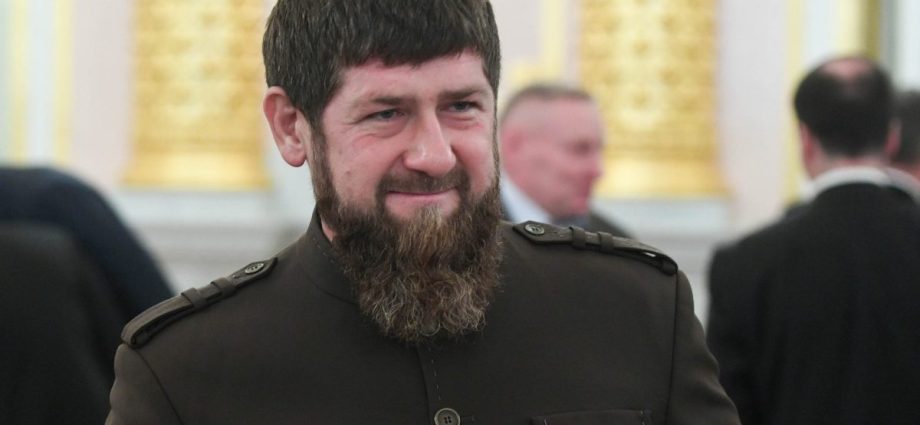
Of all the dramatic events to occur during Russia’s year-plus war on Ukraine, few approach the sensationalism of last weekend.
After months of increasingly vitriolic complaints and threats against Russia’s military leadership, Yevgeny Prigozhin, the head of the Wagner mercenary group, acted. His men first took over the southwestern Russian city of Rostov-on-Don before marching on Moscow, shooting down multiple Russian helicopters that tried desperately to halt their progress.
Finally, just 200 kilometers from the capital, Prigozhin agreed to end his march and go into exile in Belarus, in an outcome whose ultimate contours are still very much unclear.
One of the groups that rallied around Russian President Vladimir Putin was led by Ramzan Kadyrov, the mercurial Kremlin-appointed warlord of Chechnya, whose men headed to both Rostov and Moscow to confront Wagner. In this instance and future such mutinies, Kadyrov’s troops could play a crucial role in defending the Kremlin – but only to a point.
Perhaps none of the many politicians and security chiefs in Russia who owe their positions solely to the backing of Putin have benefited from this personal relationship more than Kadyrov.
Kadyrov came to power after the 2004 death of his father, Akhmad Kadyrov, with whom Putin had forged a deal to lead Chechnya as a loyal satrap after Russian forces reconquered the rebellious province in the Second Chechen War.
Widely despised by the Russian military and other siloviki (those in charge of Russian security services), the younger Kadyrov nevertheless received the full backing of Putin to run Chechnya nearly autonomously. The only caveat was that he needed to crush the region’s separatist movement.
Massive state subsidies, forming nearly nine-tenths of the Chechen government budget, were provided as both reward and incentive.
While Kadyrov and his cronies in Grozny enjoyed unparalleled autonomy, the Chechen leader was never without powerful enemies. Wagner was destined to become one of these almost from the start.
Many of Wagner’s professional soldiers were veterans of the Chechen wars, where they fought against Chechen rebel forces that, at one time, included Kadyrov himself. Ethnic Chechens are even explicitly banned from joining Wagner.
There was a degree of mutual support over the past year between Kadyrov and Prigozhin in public messaging on the Ukraine war, with both men casting aspersions on the Russian Defense Ministry and verbally attacking top Russian generals to cast the army leadership as hapless and only their own semi-privatized forces as effective.
But this was a marriage of convenience, something thoroughly illustrated by a June 1 threat from Dmitry Utkin, Wagner’s top military commander, to Kadyrov’s top deputy, urging the latter to face him “man to man.”
Kadyrov’s role in rebellion
Kadyrov had significant motivation to challenge Prigozhin’s mutiny and prevent any possibility of Putin being toppled. Not only is his position dependent on Putin’s continued financial and political support, Kadyrov also holds long-running acrimony toward the Wagner Group.
Driven by this calculus, he duly deployed his men to both of Saturday’s hotspots, sending one armored column to Rostov while directing another to the outskirts of Moscow, where Russian forces and other loyalist troops were setting up hasty defensive positions. In Rostov, Kadyrov’s Chechens nearly came face-to-face with Wagner forces, entering the city amid a tense standoff.
Crucially, however, the Kadyrovtsy didn’t engage. They never fired on Prigozhin’s men, while in Moscow, they arrived after the abrupt truce between Wagner and the Kremlin had been agreed. Kadyrov demonstrated his loyalty to Putin by immediately deploying his men, but stopped short of anything resembling combat, choosing instead to wage a war of words and loudly proclaiming Prigozhin a traitor.
In many ways, Kadyrov’s response to Prigozhin’s march was like his role in the Russian invasion of Ukraine – demonstrating loyalty but stopping short of risking any more of his own men than necessary. In the early stages of the war, the Kadyrovtsy took part in the initial drive on Kiev, while also playing a role in storming the Donbas city of Severodonetsk and (to a lesser extent) Mariupol.
But that was it. After losses, Kadyrov largely withdrew his men to rear positions, if not back to Chechnya itself. Since last summer, they’ve rarely fought in Ukraine at all.
This now is the essence of Kadyrov’s role beyond Chechnya’s borders. Even in quieter times – the eight years or so between the final crushing of the insurgency in Chechnya and the Russian invasion of Ukraine – Kadyrov has always been paranoid, worried about any potential uprising against him and any possible challenge from Moscow and the Russian security services that so despise him.
With the remnants of Chechnya’s extirpated rebel movement reconstituted in Ukraine and openly planning to return and overthrow him, Kadyrov is even more loath to risk his brutal, personally loyal security apparatus. Despite his dependence on Putin’s continued rule, it’s difficult to imagine the Chechen leader ever deploying more than a token amount of his own troops to safeguard the Russian president.
Kadyrov may declare himself a “foot soldier of Putin,” but he has little interest in degrading his own combat power, power he may need in any potential future breakdown of the existing order in Russia – or in Chechnya itself.
This article was provided by Syndication Bureau, which holds copyright.

